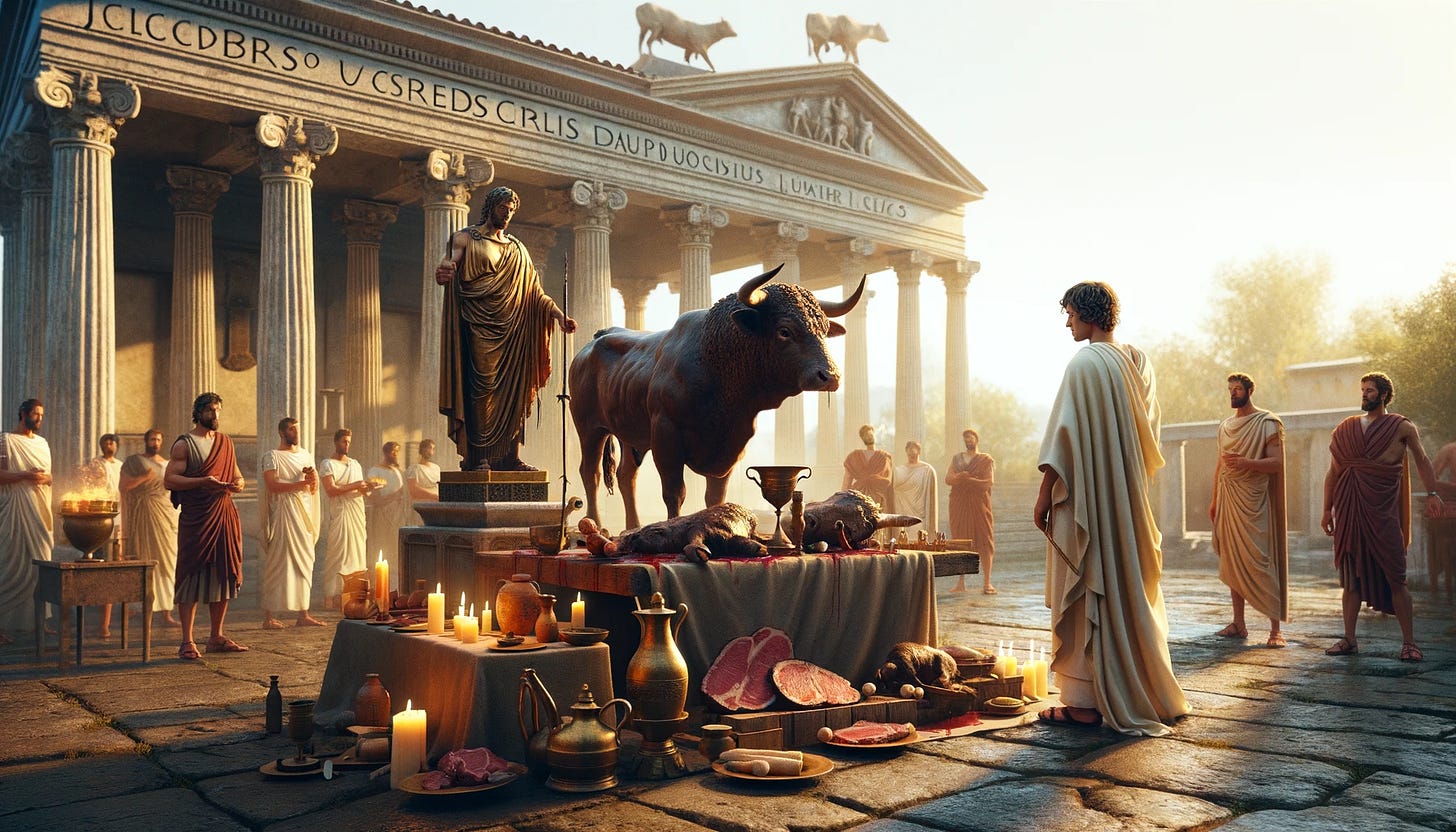
Many people say grace before they dig into their Thanksgiving feast. But the tradition of thanking the gods before a meal goes back centuries. Case in point, this prayer from Cato’s De Agricultura (160 B.C.) gives thanks to the agricultural aspect of Jupiter Dapalis. First, he offers up roasted meat and then, after washing his hands, a large cup of wine.
“Jupiter Dapalis, because it is proper for a cup of wine to be given to you in the house of my family for the sacred feast, for the sake of this thing may you be honoured by this, the feast offering.”
“Jupiter Dapalis, may you be honoured by this feast offering, may you be honoured by the wine sacrificed.”
Honey cake is one of the oldest sacrificial foods, and I dive deep into the history of this food in this blog post, which also comes with a recipe I created from two ancient Roman recipes in Apicius.
Countless ancient civilizations gave thanks to their gods in various ways. In ancient Egypt, giving thanks was a vital part of daily life. The Egyptians revered a pantheon of gods, offering them gifts and prayers in gratitude for blessings received. This practice was not just a religious ritual; it represented a heartfelt acknowledgment of the gods' influence on the Nile's fertility, essential for their agriculture.
The Greeks, known for their elaborate mythology, regularly paid homage to their gods. Celebrations like the Dionysia and Olympic Games were more than mere entertainment; they served as platforms for expressing gratitude to deities like Zeus and Athena for their protection and guidance.
This ancient practice of giving thanks to the gods goes beyond mere religious observance. It reflects a universal human sentiment – gratitude. By acknowledging the gods, ancient people expressed their understanding of a world much larger than themselves, one where forces beyond their control played a significant role in their existence. Today, while the pantheons of ancient gods may not hold the same sway, the essence of this tradition persists. Whether it's in the form of religious prayers, meditation, or simply expressing gratitude to the universe, the act of giving thanks is a timeless link that connects us to our ancestors. It's a reminder that gratitude, in its many forms, is a fundamental part of the human experience.
Contemplating Gratitude
This has been a rough year, for me, and for others that I love, and as a result, I’ve spent a lot of time contemplating death. I keep returning to a Latin phrase, Momento Mori, which means “remember you must die.” This phrase has an interesting beginning.
In ancient Rome, victorious generals were celebrated with a grand "triumph," a ceremony signifying the peak of their career. This event was both a public honor and a personal milestone, earning the general immense respect from soldiers and citizens alike.
The splendor of these ceremonies was so overwhelming that it could easily inflate a general's ego. The Romans, aware of this, devised a clever method to keep the general's pride in check. As the general paraded through the streets in a chariot, basking in the adulation of the crowd, a slave would sit behind him, quietly uttering reminders of life's transience, often in the form of the phrase "memento more," a sobering reminder that even at the zenith of fame and success, the inevitability of death remained a constant.
This practice of humility resonated well beyond military circles, finding favor with Stoic philosophers like Marcus Aurelius, Seneca, and Epictetus. They adopted "memento mori" as a philosophical tool, reminding themselves and their students of life's transience and the universal certainty of death, regardless of one's status or achievements. As a society, we would all be better off if we did more of this, IMHO.
But for the most part, we don’t. We become complacent in life. We take things and people for granted. We moan and complain about things that have little meaning. We wallow in television and video games. We are lonely and increasingly isolated by technology, so much so that it’s literally now a health epidemic.

For me, momento mori corresponds directly to gratitude. During the pandemic, when so many people were dying, and everything was locked down, I began daily journaling the things I am grateful for. And in times of stress, or sometimes moments of relaxation (lying on the acupuncture table), I will recite to myself a list of all the people and things for which I have gratitude. I look back at my life and all the things that I have gained, that I have learned, that I have had the chance to experience. This grounds me in ways I wish I had known was possible twenty or thirty years ago. In recent years, I’ve been trying hard to measure my past by what I’ve gained, not what I’ve lacked. And I have gained SO much.
Let us start with you, dear reader. What’s the point of writing blogs or writing books if no one reads them? My thanks to you is boundless. From there, the list lengthens and spirals out to infinity, to my agent, to my editors, to my publishers, to bookstores, to my writing tribe. If I start with those closest to me: my husband, my kitty, my family, my dearest friends…the list is ten times longer. These lists, while likely not infinite (because I myself am finite), are impossible for me to complete. And that’s pretty fucking cool.
The other thing I’ve been trying to do more of is to revel in joy. Whether it’s driving home from acupuncture the other night and glimpsing the most amazing thumbnail of light emanating from that big rock of a moon in the sky and gasping with the beauty of it, seeing love in the eyes of a dear friend over coffee, cuddling with little Merlin every morning on my chair when I journal, or learning about fun things like this wonderful Oaxacan festival of the radishes and realizing how quickly my face lit up when I saw the carved vegetables—I am finding so many small moments of joy.
“Count thy blessings” and “enjoy the little things” really do help—if you take time to do so.
WHAT’S BRINGING ME JOY THIS WEEK
This bizarre AI image made me totally LOL. It came from the prompt: “An image of an ancient Roman sacrifice of a white bull to the god Jupiter.” Um. There are so many things going on here. That tiny goblet! The man picking his nose with some weird implement in his deformed hand! The wormy things on the plate! The Baroque/Medieval styling of the clothing in the audience! The man with the white-winged hair and brown beard! And that stare…that bull is NOT going down today.
This word game, RobinWords, which is fun and a little hard. You have to get to each word by creating new words, one letter at a time.
Click through to this post of a kitty near the Largo di Torre Argentina drinking from one of Rome’s many nasoni.
And finally, this gem full of factoids from this week’s SNL.
For my American audience, I wish you all a happy Thanksgiving. And for those of you who need it, I’m sending you all the calm, you’ll-get-through-it {{{vibes}}} for your family drama. 🦃🦃🦃🦃
If you love food and love Italy, and haven’t read THE CHEF’S SECRET or FEAST OF SORROW, click the links to learn where to buy your copy! 🍒🍗🍷
You can also follow me in these places too: Website | Instagram | Facebook | Threads




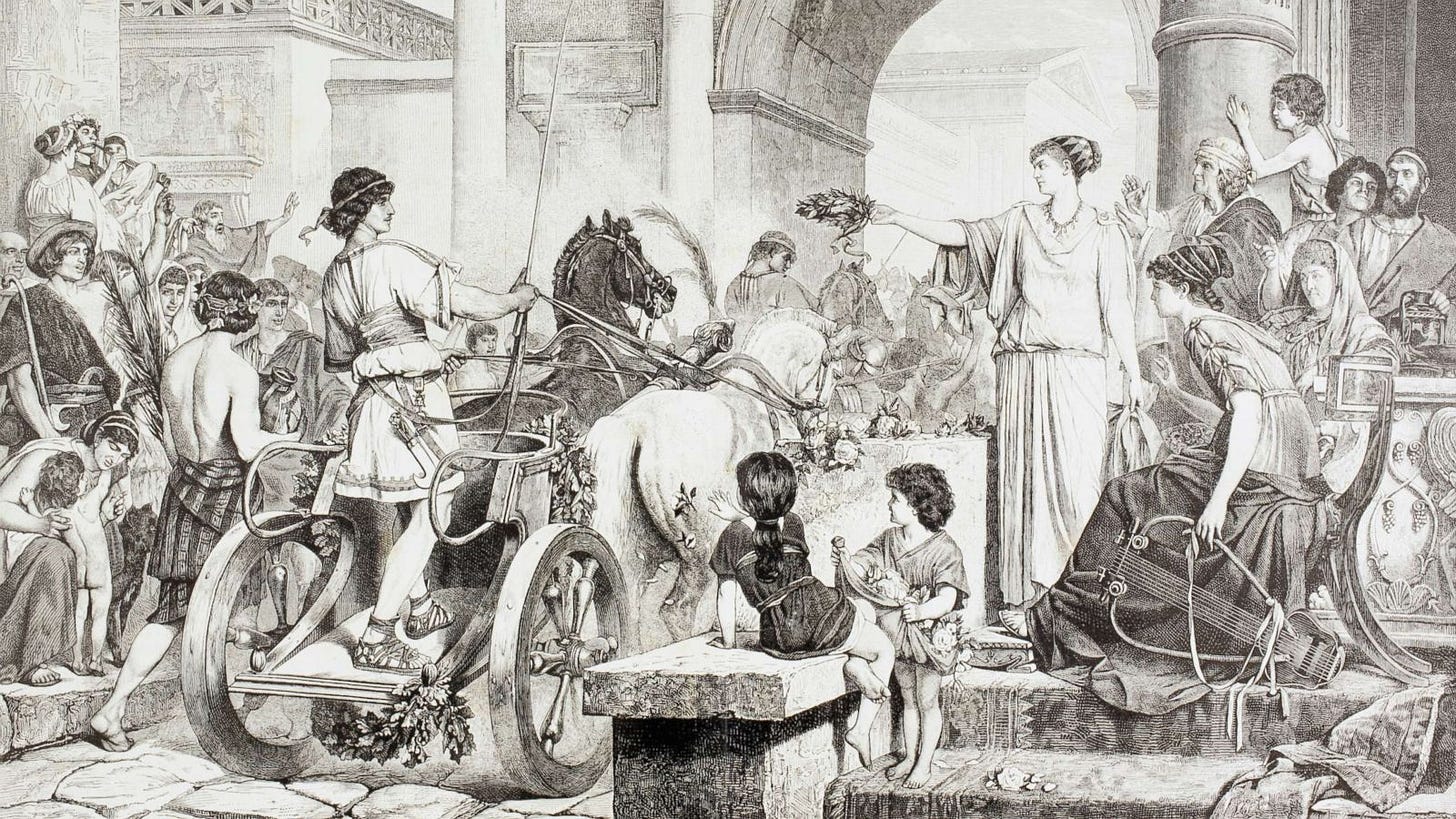
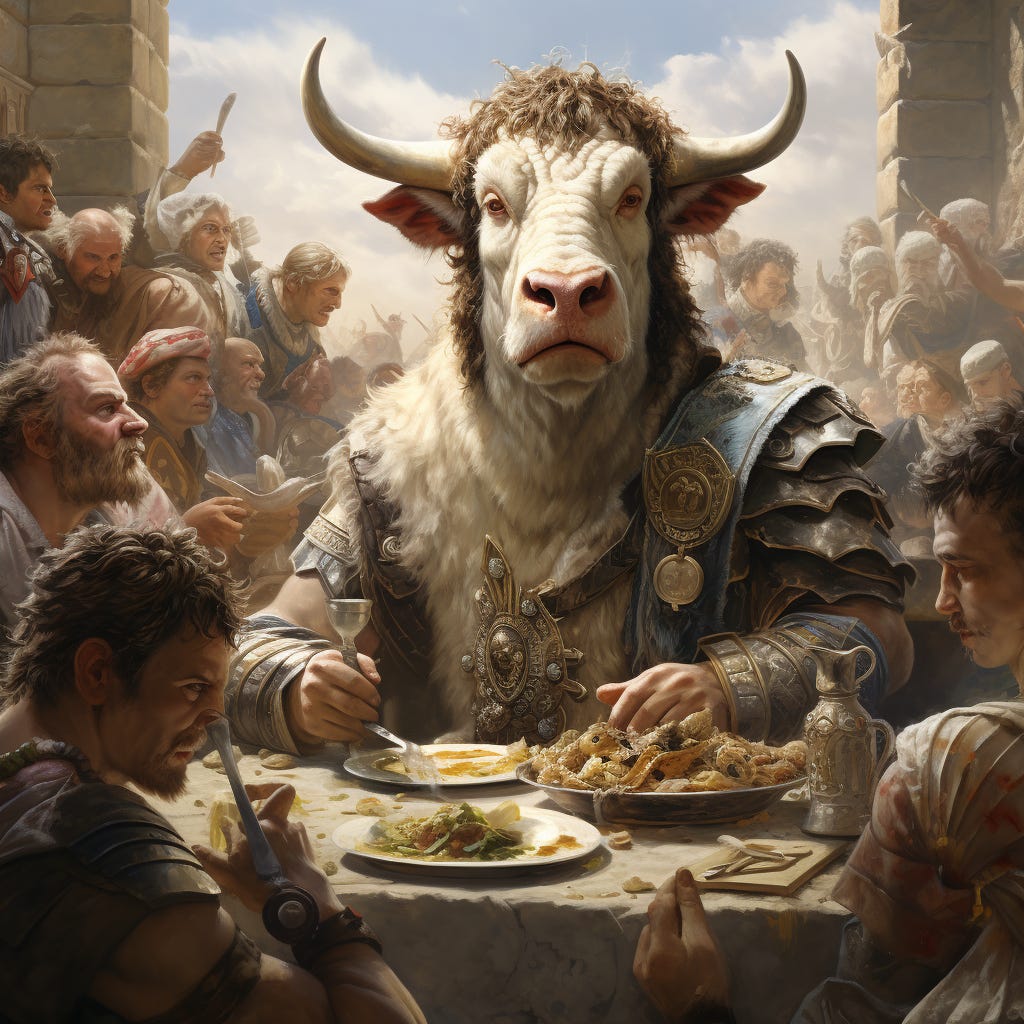
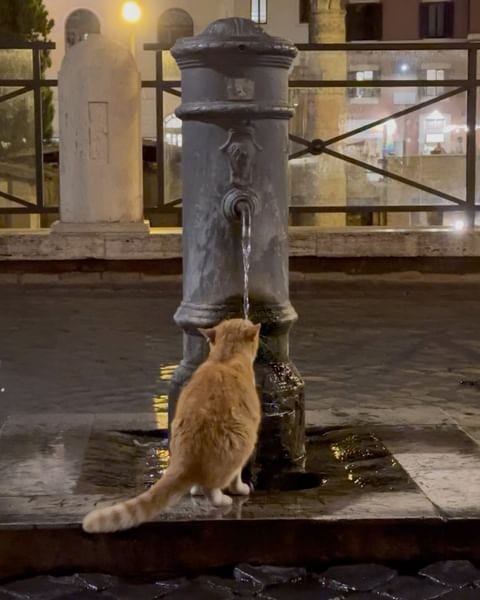
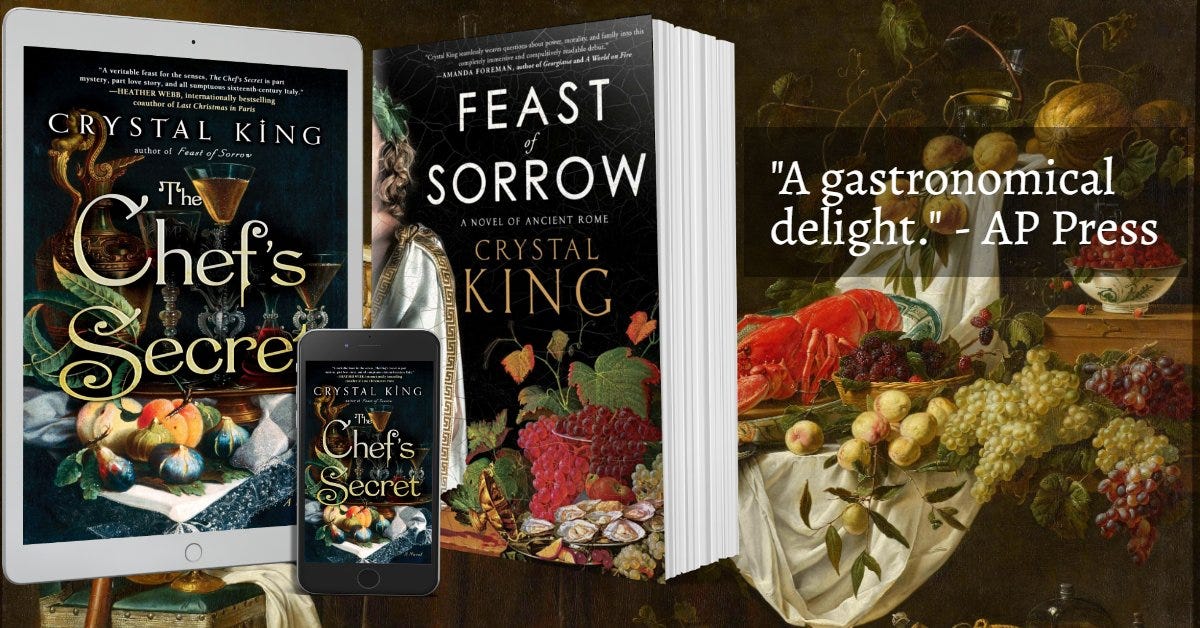
I’m honestly grateful for your informative posts, always written with clarity and humor and a genuine interest in not just the subject but in us, your readers, and how we might benefit from what’s on your mind and in your heart. Appreciate you.
I always enjoy your posts! Most informative!!